Kamala Harris on Revenge Porn, Economic Justice, and Why She’s “Tired of These Out-of-Touch Politicians”
Jessica Pels: Welcome, Senator Harris.
Kamala Harris: It is great to be with you.
Jessica Pels: We’re so glad you’re here at Cosmo.
Kamala Harris: Thank you.
Jessica Pels: Will you tell us what brought you to Cosmo? Why you wanted to come to Cosmo today?
Kamala Harris: Well, you have the ear, the eye, and the trust of so many women—I know you have men who are readers too—but of women, who have so much at stake in this election. And I do believe that justice is on the ballot in 2020, and there are so many issues that you often cover that are fundamentally about justice or injustice, be it economic justice, be it reproductive justice. And so the opportunity to talk with you, and by extension to talk with your readers, is an opportunity to share information in a way that I think helps to empower people around the issues of the day.
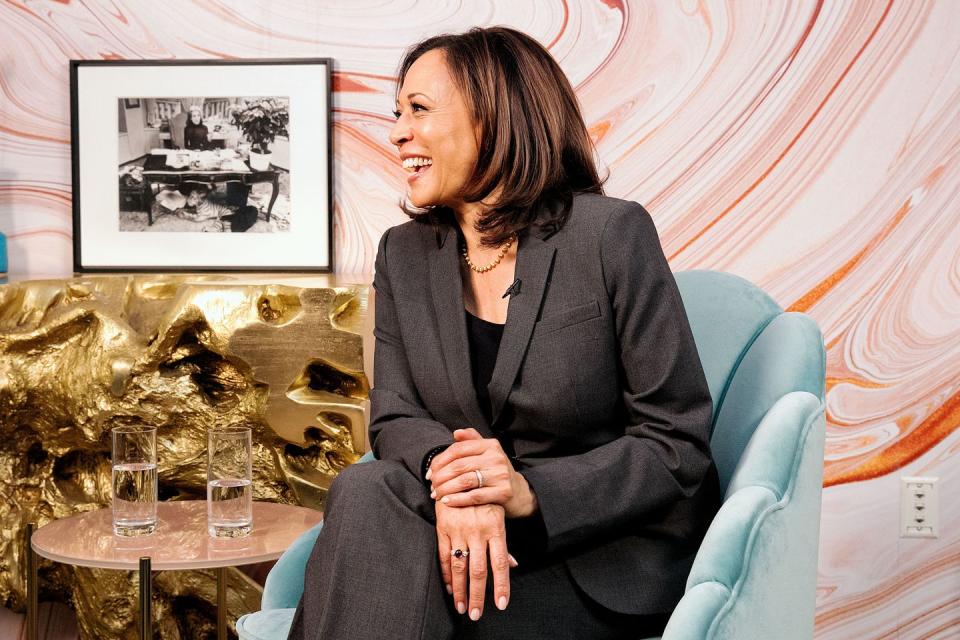
Jessica Pels: That’s great. And we have 81 million readers—
Kamala Harris: That’s great.
Jessica Pels: ...who are really looking for depth of insight—
Kamala Harris: That’s right.
Jessica Pels: ...into how the presidential candidates will prioritize the issues that matter to young people and, particularly, to young women, as you say. And what’s interesting is that 54 percent of our readers tell us that the debate format is not very helpful for them.
Kamala Harris: Yeah, I agree with that.
Jessica Pels: What do you not like about the debate format?
Kamala Harris: I have many sayings, and one of them is, “No good public policy ends with an exclamation point.” Right?
Jessica Pels: As a grammarian, I love that.
Kamala Harris: Right? Right, right. And so the debate format is, if you are fortunate to get the question at the right time, you get a whopping 1 minute and 15 seconds to answer it. If you’re as a follow-up or not first, then you will get 45 seconds, and, oh, for the rebuttal, a good 15 seconds. So when we are talking about very complex issues—they’re not complicated, but they require a level of understanding and an appreciation of the depth, sometimes the nuance. It’s just very challenging to do it on the debate stage because the incentive on the debate stage is to get massive applause. But there’s so many things that we really want to think about that are not going to elicit an applause but certainly elicit thought.
Jessica Pels: That’s so interesting. As a viewer, you don’t necessarily think about being in the room, seeking the immediate approval, essentially, of the audience that’s there. Does the applause, do you think, drive a lot of how people strategize around the debate?
Kamala Harris: I’m still trying to figure out what makes for a successful debate, and there is, I think, a fair amount of it, sadly, that is about performance. And that’s why this opportunity to sit and have a conversation is so meaningful.
Jessica Pels: Just to put this bug in your ear—
Kamala Harris: Yes.
Jessica Pels: ...our reader has said that topic-based debates, topical debates, would be more helpful to them.
Kamala Harris: I agree. Totally agree.
Jessica Pels: And I would suggest that we would need to insert women’s reproductive rights, even sexual assault policy, into that discussion.
Kamala Harris: I agree completely. I mean, in the last debate, I brought it up because we’d had, at that point, six presidential debates and no meaningful discussion about one of the biggest issues for women and their families in America, which is that around the country, women’s access to reproductive health is under attack. And it is not an exaggeration to say women will die because of these policies, in particular poor women and women of color, because it is they who will not have the resources to be able to travel where they can get physician-assisted treatment.
And so what they’re left to is desperate measures, which can result in real harm and death. So that’s one issue. Sexual assault is an area I focused on for a large part of my career. People know or are familiar with my connection with the work most recently because of the Kavanaugh hearings. But it is something where when I was a young prosecutor, I specialized in child sexual assault and domestic violence and human trafficking throughout my career.
And these are issues that women and men, again, are dealing with every day in America, and we are not talking about it. We are not bringing these issues out of the shadows in a way that gives the survivors a safe place to go without judgment and to be given dignity and respect.
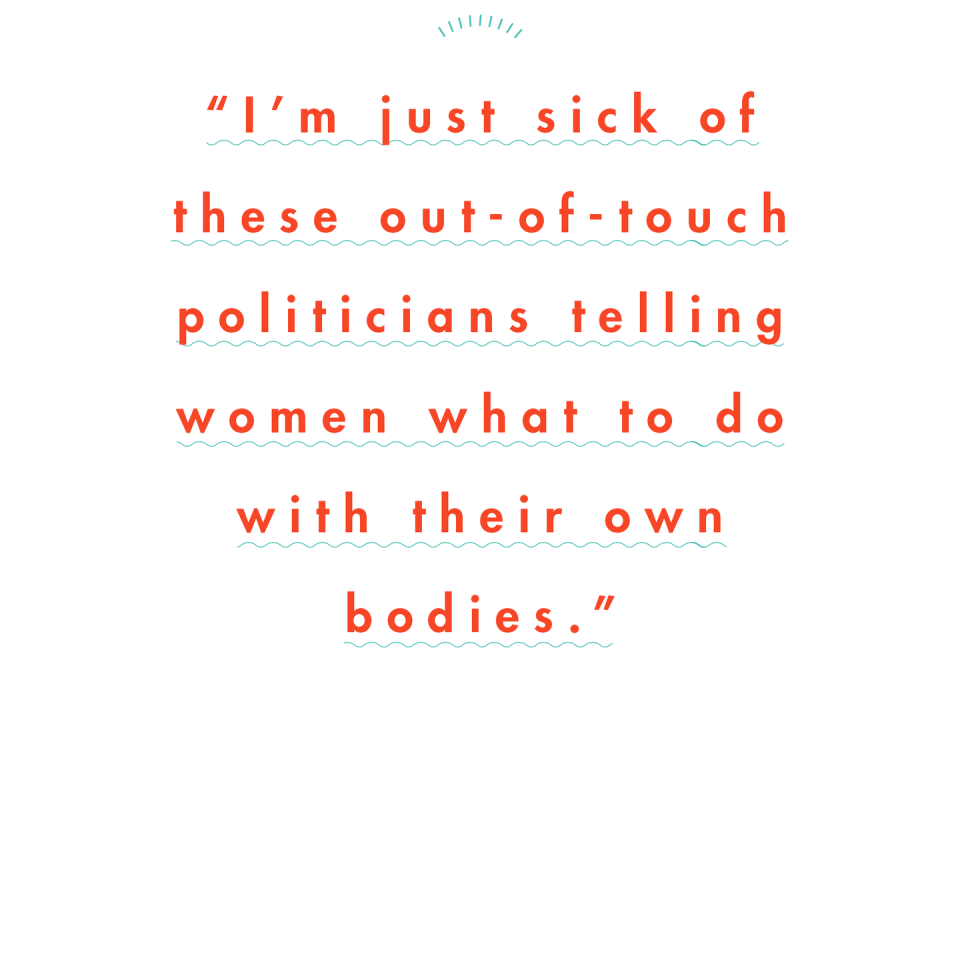
One of the issues that I’ve dealt with in the last few years that is associated but has been highlighted because of technology is what the press calls “revenge porn.” But I’ve said, “Stop using that term.” Because the term “revenge porn,” one, “revenge” suggests that she’s done something wrong that then deserves this kind of response, which, of course, is ridiculous. What she did is she was in a consensual relationship, taking photographs, sharing them in a consensual relationship, and then she breaks up with dude and he’s upset about it and then tries to figure out how to embarrass her and demean her and belittle her and then publishes these photographs. So she has done nothing that deserves this conduct.
“Porn.” Well, one, it’s a loaded term, meaning it is loaded with judgment, but two, and most importantly, she did not take that photograph with any intention that it would be published for the public. So it is not “revenge” or “porn.” And for that reason, I’ve said that the term should be “cyber exploitation.” Right? Which is the use, right, of cyber technology in a way that has been designed and intended to exploit predominantly women.
And on that subject, as with so many things, we’re still at a point in America where people are really uncomfortable with women’s sexuality. And so there’s so much judgment that attaches with that and an attempt to shame women. Right? So I could go on with more detail, but this is the range of things that I think about when we’re on this topic.
Jessica Pels: As the sort of OG women’s magazine of sexual empowerment—
Kamala Harris: Yeah, that’s right. That’s exactly right.
Jessica Pels: ...that’s something we face every day.
Kamala Harris: Right.
Jessica Pels: You talk about reproductive rights, and so I’ll start there.
Kamala Harris: Good.
Jessica Pels: I see a bit of conflict between your deep respect for the law and what’s happening for women in states that are trying to pass really restrictive bans on abortion.
Kamala Harris: Yeah.
Jessica Pels: So, states like Georgia or Alabama.
Kamala Harris: Yeah.
Jessica Pels: What would you, as someone who does respect the law and understand it so well, what would you say to a woman who is in a state like that, needs an abortion, and can’t afford to travel?
Kamala Harris: So one of the reasons I’m running for president is because I have a long-standing commitment to fighting for women’s rights. And this is a constitutional issue, as outlined by Roe v. Wade. So I’m running for president to say, any state that passes a law that restricts a woman’s constitutional right to make decisions about her own body, that law is going to have to be reviewed by my Department of Justice to determine, does it comply with the constitution in Roe v. Wade? And if it does not, it will not go into effect. That’s what I’m prepared to do, which is we’re going to deal with it on the defensive, which is we’re going to support the nonprofit organizations like Planned Parenthood and NARAL and others who are doing the work on the ground to support these women and their families. We’re going to support the nonprofit legal organizations that are challenging these laws, these unconstitutional laws, in court.
But I’m also prepared to take it on the offensive to say, “Fine. Okay. So you, state that passed a law that is clearly unconstitutional, it’s going to have to be reviewed by the United States Department of Justice. If it doesn’t pass muster, it’s not going into effect.”
Jessica Pels: So, as opposed to waiting for a case to be brought in front of the Supreme Court?
Kamala Harris: Yeah, because we have already a system for what I’m talking about, which is called preclearance. So under the Voting Rights Act, as an example, it was the case for years that a state who had a history of violating people’s right to vote and suppressing the vote, that law, whatever they passed, would have to go through the United States Department of Justice for preclearance. Because we already know that you are inclined to violate someone’s constitutional rights.
Jessica Pels: Fascinating.
Kamala Harris: These out-of-touch politicians telling women what to do with their own bodies. During the Kavanaugh hearing—here we have, then a nominee to the United States Supreme Court. And so I asked him—I’m on the Senate Judiciary Committee—I asked him, “Can you think of any law that tells a man what to do with his own body?” “Uh, uh, uh, no.”
So we’re literally talking about, as with so many cases that, in essence, from my perspective, are also about civil rights and equality, we’re literally talking about a situation where the law applies differently based on gender.
Jessica Pels: You represent California, which is a state that’s heavily impacted by climate change as we have seen again and again.
Kamala Harris: Right.
Jessica Pels: Climate change is now the most important issue for young voters—
Kamala Harris: Rightly.
Jessica Pels: ...yet President Trump formally notified the UN this week that he’s pulling the U.S. out of the Paris Climate Accord. So how would you, as president, reestablish American leadership in this discussion and in this effort, and how do we catch up?

Kamala Harris: Yeah, it’s outrageous what’s been going on. This issue of the climate crisis represents an existential threat to who we are as a species and it is without debate among those who accept science—sadly, there are those who do not accept science—that within 12 years, if we do nothing, the harm will be irreversible. Okay. So what we do: Immediately after I get elected, reenter the Paris Agreement, immediately enter the Kigali Agreement to the Montreal Protocols, which is about basically the other types of pollution that are harming our environment. Immediately, we reestablish our position on the national stage, which is a role of leadership. And maybe this is where also, being a native Californian, I have a perspective that is about optimism.
I’ve seen what we can do. For anybody who visited Los Angeles 20 years ago, they will tell you, “If you looked up at that sky, it was brown.” On the morning news, the newscaster would say, “Not a good day for children or seniors or pets to go outside.” Right? Because of the air quality. And then finally people said, “You know what? Enough. Leaders need to lead.” And we put in place some of the smartest and toughest laws around greenhouse gas emissions, around looking at behaviors that are contributing to compromising our environment. And you look up today at the sky in L.A. and it’s blue. I, as attorney general of California, ran the second largest Department of Justice in the United States, second only to the United States Department of Justice. I took this issue on. I fought against the big oil companies and we won. And I plan to do that as president because the other piece of this that’s really important to understand is that the crisis did not occur naturally.
Like, let’s really be clear about this. It’s not like this just naturally happened. It happened because of pollution. And the polluters, in particular fossil fuel companies and the big oil companies, have made a whole lot of money off of what has caused the pollution. And not unlike big tobacco, these companies did the research to know what they were causing, but they were making so much money, they’ve been making so much money, they just let it happen. And so, you know, me, my background as a prosecutor perhaps is what motivates this. But I will tell you as president, I am fully prepared to hold those big oil companies accountable for what they have done and are doing. And I am prepared to say there will be a fine or people will be charged with a crime if they don’t correct behaviors. But we can’t put profit over public health in that way.
Jessica Pels: The second most important issue to our audience is student debt.
Kamala Harris: Yes.
Jessica Pels: Partially because the average American now leaves college $33,000 in the hole.

Kamala Harris: Right.
Jessica Pels: So 51 percent of our readers believe that all student debt should be forgiven. But you’ve proposed far more limited loan forgiveness than some of the other candidates. Can you explain why?
Kamala Harris: I don’t believe Donald Trump’s kids should get loan forgiveness. I mean, that’s it, in a nutshell. That’s it. And by that, I mean that there should not be loan forgiveness for people who can afford to pay it. I’m going to focus on loan forgiveness for families that make less or individuals who make less than $100,000 a year. And free community college and debt-free college and also, equally important, interest-free loans. Because over a period of time, it was once the case that the federal government actually was in the business of issuing student loans and then it increasingly moved into the private sector that have made a business out of this.
And again, so then profit has kicked in, and my perspective is nobody should be profiting off of your desire to get an education. So I want to take the interest out of it. And also, when I was attorney general of California, I took on and actually put out of business one of the biggest for-profit colleges because there are a lot of predators in this space. And again, no one should be profiting off of someone’s desire to get an education.
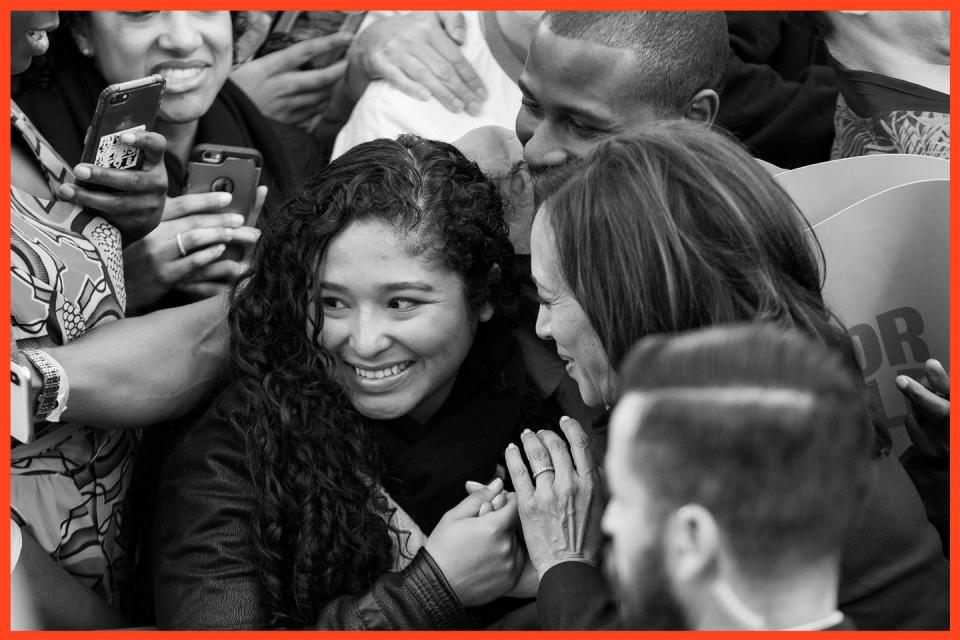
Jessica Pels: And of course, the colleges themselves profit significantly. And the inflation of tuition is a big piece of this that doesn’t get discussed very often.
Kamala Harris: You’re right. You’re right. And we have to rein that in. We have to rein that in. We have to look at the fact that, again, tuition has been increasing at a rate that is so far out of pace with the average salaries, which is also an extension of just the fact that cost of living in general for American families has been going up and up, whereas salaries and wages have not, and it’s a huge issue. Putting it in the broader context, almost half of American families can’t afford a $400 unexpected expense. More than half of American families will go bankrupt from a $500 medical bill. In 99 percent of the counties in our country, if you’re a minimum-wage worker working full time—and the majority of minimum-wage workers are women—if you’re a minimum-wage worker working full time, in 99 percent of the counties, you cannot afford market rate for a one-bedroom apartment. That’s why I say economic justice is on the ballot.
And when you combine that with equal pay issues, okay, here’s the thing: 1963 is when the United States Congress passed the Equal Pay Act. Now let’s all close our eyes and imagine who was in the United States Congress in 1963. Okay, now you have the image. Those dudes recognized that equal pay was an issue. They recognized that women are not being paid equal for equal work. They did. Fast-forward to the year of our lord 2019, and women are making on average 80 cents on the dollar, black women 61 cents, Native American women 58 cents, Latinas 53 cents.
I’m done, because the reality is that there is no longer a need to have the conversation about the fact of it, it’s pretty well established. So I have a whole plan for what we need to do in terms of dealing with equal pay, and essentially, it is this: Instead of putting the burden on working women to prove they’re not being paid equal for equal work, we’re going to shift the burden to the corporations to prove they’re paying people equal for equal work. And they’re going to have to post that on their website and then they may be looking at a fine if they don’t, based on the previous year’s profits.
Because I believe that public policy—back to the earlier point about that debate stage and the challenges of talking in a minute and 15 seconds—public policy should be connected with how people are actually living. On the issue of equal pay, you know what that means? It means the woman is working in that cubicle, knows that the guy next to her is making more than she is. And the only way to actually fix the problem is she’s got to prove it. She’s a working woman. She may be raising a family by herself or with her spouse, but she’s got to work and pick up the kids and she’s supposed to prove this thing? Like an investigator? And a lawyer? It’s just wrong on something that’s so fundamental, which is equal pay for equal work. Right? So these are some of the issues at play.
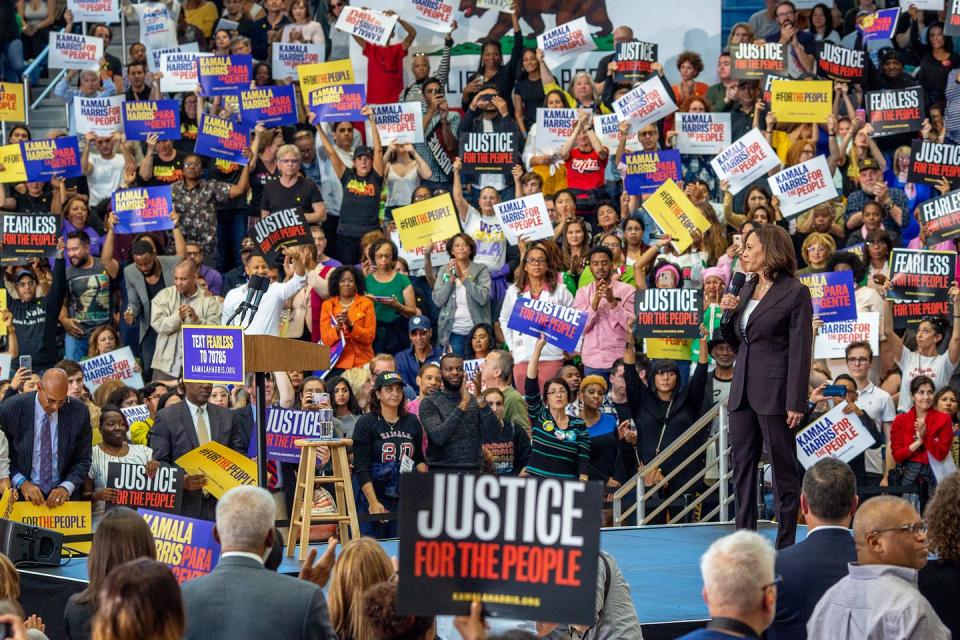
Jessica Pels: Yes. Just some of the little things.
Kamala Harris: Yes, yes.
Jessica Pels: Okay. So according to recent reports—
Kamala Harris: Yes.
Jessica Pels: ...your campaign has struggled financially and you’ve laid off staff. I want to know if this is indicative of the health of your candidacy and if you intend to stay in the race and if you’re shifting strategy? Tell me about what’s going on.
Kamala Harris: That’s great. I am definitely in this race, and I am in this race to win. We have always been focused and I am currently focused on Iowa. It’s the first-in-the-nation primary and, yeah, we had to make critical decisions about putting our resources into Iowa, which meant laying some folks—basically reconfiguring our resources in terms of where we were putting our resources, and we have to put our resources in Iowa and make some tough decisions, which, as you know when you run something like this, you’ve got to make tough decisions.
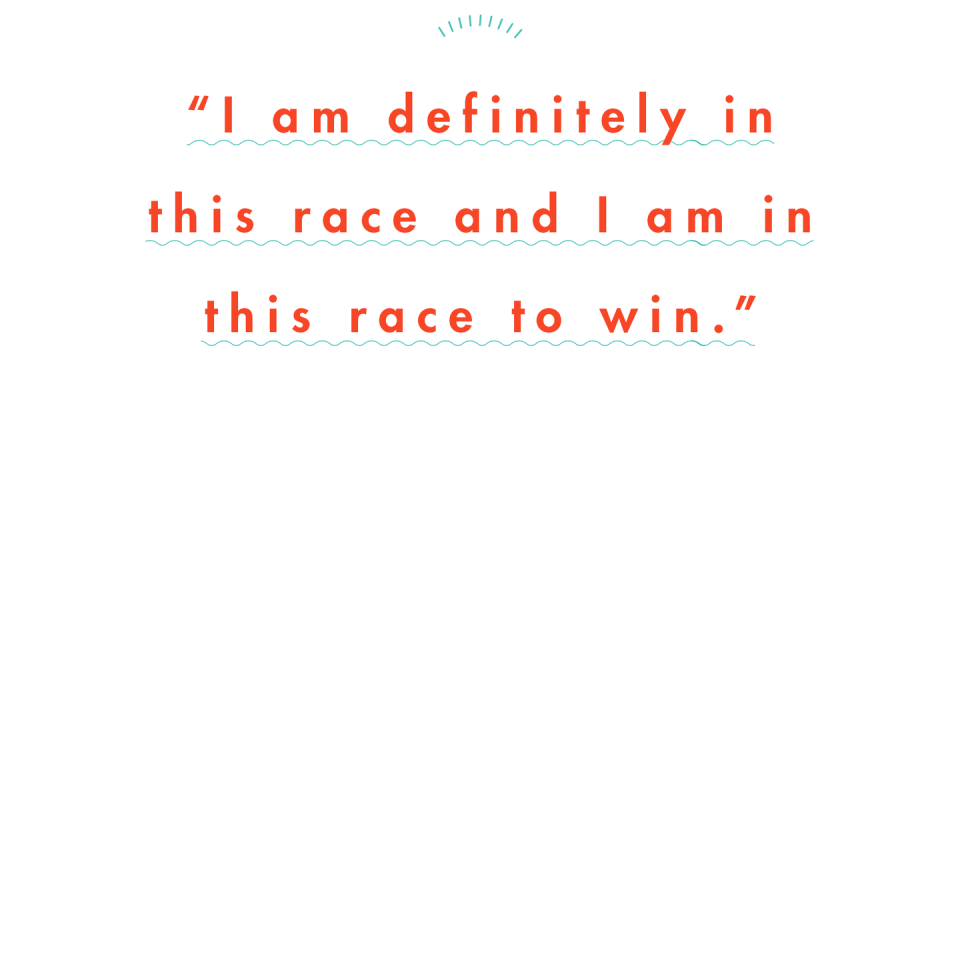
And the bottom line, though, is that I’m really fully aware of what our campaign is asking of people. And I want to talk about this for a moment because it’s the elephant in the room in our campaign, if not the donkey in the room. And it’s this, and the conversation goes something like this: “I’m not sure if America’s ready for a woman of color to be president of the United States. I’m really, I’m there, but I don’t know if my neighbor’s there.” “Oh, you know, maybe it’s not your turn. Maybe it’s not your time. Oh, it’s going to be so difficult.” Well, I will tell you, this is a conversation that is not new to me. In fact, this is a conversation I’ve heard in every campaign I have—and now here’s the operative word—won.
And I say this not to say anything about myself but to say everything about who the American people are, which is we have the ability to see what is possible even when we’ve never seen it before. We have the ability to believe and have faith in what can be, unburdened by what has been. But I am fully aware of what we are asking of people, which is to see that. But here’s the other thing I know: People cannot afford to be passive on this, cannot afford to sit back and wait for someone’s permission to tell you what is possible. When we believe in what is possible, we make it possible. And here’s the bottom line: There is nothing that, as a nation, we have achieved that has been about progress—be it our fight for social justice, our fight for civil rights, our fight for equality—nothing we have achieved that’s been about progress came about without a fight. And a fight against great obstacles.
So I know what is possible. I know having been elected the first woman district attorney of San Francisco and the first woman of color to be district attorney of any county in a state of 40 million people. I know, having been elected attorney general of California, running the second largest Department of Justice as the first woman and the first person of color of any gender. I know having been elected to the United States Senate as only the second black woman in the history of the United States Senate to be elected to that body, considered the most deliberative body in the world. I know that there will always be odds against it, but I never give up. And so far, we’ve done okay. And so far, we’ve done okay.

Jessica Pels: I know my editors are champing at the bit to ask you a couple of questions—
Kamala Harris: Yeah, for sure.
Jessica Pels: ...so I’m going to turn it over to these guys. Taylor, do you want to go first?
Taylor Andrews, assistant editor: Senator Harris, I’m from Kansas, which is a predominantly red state. And my dad and some fellow friends in Kansas also lean conservatively, but they don’t plan on voting for President Trump in the next election. Why should conservatives and/or moderates vote for you versus another Democratic candidate?
Kamala Harris: That’s a great question. You know, it’s really basic. I believe that one of the biggest challenges that we face right now is that we have had, for at least a few years now, powerful forces that have been trying to sow hate and division among us as a country, that have been trying to get us as Americans to point fingers at each other, been trying to get us to turn on each other. And we need to heal and we need to unify as a country. And because that is the source of our strength, let’s be clear about that. And our well-being.
I know I am uniquely positioned to be able to do that because in my core and based on every life experience I’ve had, I know something to be true, which is that within the beauty of the diversity of our nation, the vast majority of us have so much more in common than what separates us. I know to be true that when the vast majority of us wake up in the middle of the night with that thought that’s been weighing on us, we are never thinking that thought through the lens of the party with which we’re registered to vote. We are never thinking that thought through the lens of some simplistic demographic some pollster put us in. And for the vast majority of us, when we wake up thinking that thought, it has to do with one of just a very few things: our personal health, the health of our children or our parents.
For so many Americans, “Can I get a job, keep a job, pay the bills by the end of the month, retire with dignity?” For our students, “Can I pay off those student loans?” The vast majority of us have so much more in common than what separates us, and that’s why my focus is on dealing with those things. One of the issues that we have not discussed, as an example, is the issue of what we need to do to build back up our economy around things like infrastructure. That’s about jobs. That’s about dealing with the fact that America’s roads and bridges are falling apart. That’s about investing in the people of our country. And people couldn’t care less...this affects people regardless of who they voted for in the last election.
And I could go on and on down the list about those issues that have nothing to do with the party with which you’re registered to vote that need to be addressed and fixed. And that’s why I’m running for president.
Taylor Andrews: Thank you.
Kamala Harris: Thank you.
Jessica Pels: Shannon?
Shannon Barbour, news writer: Hi. You said you’ve been in favor of legalizing marijuana.
Kamala Harris: Yeah.
Shannon Barbour: What do you plan to do to make sure that the industry isn’t just open for wealthy investors and is—
Kamala Harris: Great question.
Shannon Barbour: ...accessible and open for communities and people who have been hugely prosecuted for marijuana?
Kamala Harris: I agree. I agree with you completely. And that’s a very big part of my focus on when we legalize marijuana, how we need to do it. To your point, one of America’s biggest modern shames is the system of mass incarceration that has led to the incarceration, in particular, of black and brown men and, in particular, fueled by that failed war on drugs, which is one of the reasons why I’m in favor of legalizing marijuana. And when we look at it, we’re now talking about in various states, including my home state of California, have legalized it. And this whole new industry—we can talk about the beauty industry, let’s talk about the marijuana industry. Let’s talk about CBD, right? All these products, right? That are all of a sudden going to relieve every problem I have, because I’m going to rub it all over my body, right?
And it’s a huge cash cow, this industry. People are making so much money off of selling weed. Meanwhile, generations of folks, in particular black and brown men, are felons for life for doing the same thing. On its face, this is wrong, unfair. It is a travesty.
So part of my plan for nationally legalizing marijuana is to make sure that those folks who have been previously incarcerated, who have been convicted, who have been designated felons, one, that we deal with what we need to do around expungement but also that they be the first in line for those jobs. That they be the first in line for qualifying for the licenses to run these businesses, because it is something that, on its face, is so patently unfair and wrong. So it’s a great point you’ve raised, and it’s very much on my mind. Thank you.
Jessica Pels: Okay, so, now we get to have some fun.
Kamala Harris: Okay.
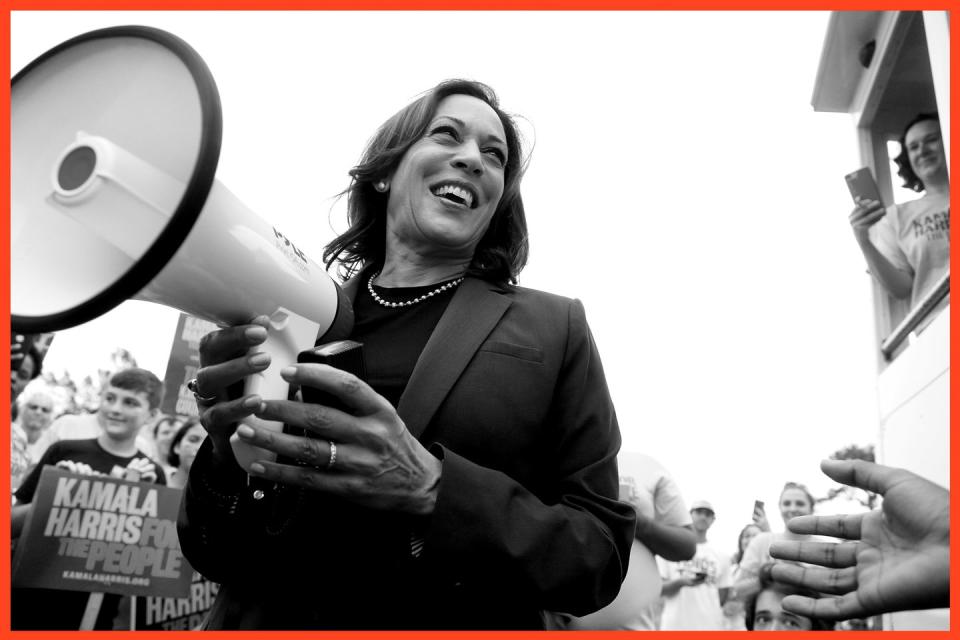
Jessica Pels: I have a rapid-fire round of questions for you. All right, so we will start: What is the scariest thing you’ve ever done?
Kamala Harris: Scariest thing I’ve ever done. Oh my god, let me think. Oh, I know. I was in a—what are those machines called when you have to get an X-ray? Because I broke my arm in a little skiing accident.
Jessica Pels: MRI machine?
Kamala Harris: An MRI machine! Scary. I learned at that moment I’m claustrophobic, yes.
Jessica Pels: Not good.
Kamala Harris: Awful.
Jessica Pels: What is your favorite Thanksgiving dish?
Kamala Harris: I love stuffing, but with gravy. It’s got to be! And then a nice piece of turkey on the side. That combination.
Jessica Pels: So the whole meal?
Kamala Harris: You know what my favorite Thanksgiving meal is? Thanksgiving leftovers.
Jessica Pels: Yes.
Kamala Harris: Can we go there? That’s just it, right? That is it.
Jessica Pels: Yes. We just published last month “Thanksgiving leftover pizza” as an idea. So just put that in your hat.
Kamala Harris: But what would you do for the crust?
Jessica Pels: You get a regular crust.
Kamala Harris: Because you know what you could do? You could do, well, I do cornbread stuffing.
Jessica Pels: Oh, yeah.
Kamala Harris: But you could do a cornbread meal, you could do cornmeal pizza dough.
Jessica Pels: Yes.
Kamala Harris: Right? Think about it, right? Yeah, you’re getting around, right?
Jessica Pels: It’s too late to edit that story, but…
Kamala Harris: Okay, right?
Jessica Pels: Thank you. That was an upgrade.
Kamala Harris: You’re welcome.
Jessica Pels: What do you think of Maya Rudolph’s portrayal of you on Saturday Night Live?
Kamala Harris: Hilarious, and I will tell you I fully intend to make sure that she has another eight years of good work.

Jessica Pels: Love that. Who is the last person you texted?
Kamala Harris: My niece. Yes.
Jessica Pels: Aw.
Kamala Harris: Yes.
Jessica Pels: You are a Libra.
Kamala Harris: Yes.
Jessica Pels: What is the most Libra thing about you?
Kamala Harris: I am passionate, and really to the point of that it will bring me to a fight for fairness. It is one of the things that moves me the most, when things are unfair.
Jessica Pels: What’s your favorite app?
Kamala Harris: The New York Times Cooking app. It really is.
Jessica Pels: I love it. Okay, your husband, Doug.
Kamala Harris: Yes.
Jessica Pels: Would he be First Man, First Spouse, something different, as far as his title goes?
Kamala Harris: Well, he would be the first.
Jessica Pels: That’s for sure.
Kamala Harris: Yeah, he’s so comfortable in his skin, I don’t think the title would matter to him. Yeah.
Jessica Pels: How did you celebrate your birthday?
Kamala Harris: I celebrated my birthday in Iowa and in South Carolina.
Jessica Pels: What did you do?
Kamala Harris: I campaigned. I did, but then Doug and I had a nice dinner at the end of the day, but it was great. I mean, we celebrated it with a lot of really incredible supporters and friends, so it was a good day.
Jessica Pels: That’s great.
Kamala Harris: It was a good day.
Jessica Pels: What is your secret talent?
Kamala Harris: I love to cook. I’m a pretty good cook. Yeah.
Jessica Pels: Great. Okay, and finally, our infamous question.
Kamala Harris: Okay.
Jessica Pels: What is your skincare routine?
Kamala Harris: Cetaphil, so I—
Jessica Pels: You got a lot of nods from this crew.
Kamala Harris: Yeah. No, so since I’ve been campaigning, I use the wipes, the Cetaphil wipes, to clean, but otherwise I use the skin cleanser and that’s it. And then I have just a regular moisturizer, and that’s it. It’s pretty simple—
Jessica Pels: Just moisturizer?
Kamala Harris: Yeah.
Jessica Pels: At least you moisturize. The male candidates do not. And so we’re working on fixing that.
Kamala Harris: But you know what I’m trying to figure out? Serums.
Jessica Pels: Yes.
Kamala Harris: All of a sudden, they’ve become a thing, and then there are all kinds of them. And then some of them say they’re a lotion but it clearly looks like a serum.
Jessica Pels: The texture is more like an oil, and you’re supposed to put them on clean skin and then moisturize.
Kamala Harris: But then they say, “Leave it on for a minute to absorb.” And it just feels like a lot of work.
Jessica Pels: It takes time. It takes dedication.
Kamala Harris: Yeah. Yeah.
Jessica Pels: You’re short on time these days.
Kamala Harris: Yeah.
Jessica Pels: Which is why we’ll wrap up.
Kamala Harris: Okay.
Jessica Pels: Thank you so much—
Kamala Harris: Thank you.
Jessica Pels: ...for being here.
Kamala Harris: It’s great to be with you.
Jessica Pels: Thank you.
Kamala Harris: Thank you, guys.
Jessica Pels: Thanks, guys.
****
Kamala Harris: I read what you guys are doing. I mean, it’s extraordinary, because there’s so much about empowerment that’s also about reminding people they’re not alone.
Jessica Pels: Mm-hmm.
Kamala Harris: Right?
Jessica Pels: Mm-hmm.
Kamala Harris: And there’s so much that happens to young women, and women in general, that causes us to suppress ourselves as a priority. And that means suppress the idea that we have, that we feel if we speak it, it’s not going to be acknowledged, or just our needs, including self-care needs, right? And you guys speak to so many women in a way that reminds them that everything they’re thinking and feeling is legitimate and should be spoken and heard. And that we don’t need approval to use our voices. We don’t need permission. Right? That’s the thing. That’s the thing we have to keep reminding each other. We don’t need permission to speak. We don’t need permission to lead. Right? That’s critically important to always remember that. You don’t need anybody else’s permission to be who you are and to take on what you choose to take on. Enough of that. “Mother, may I?” is over.
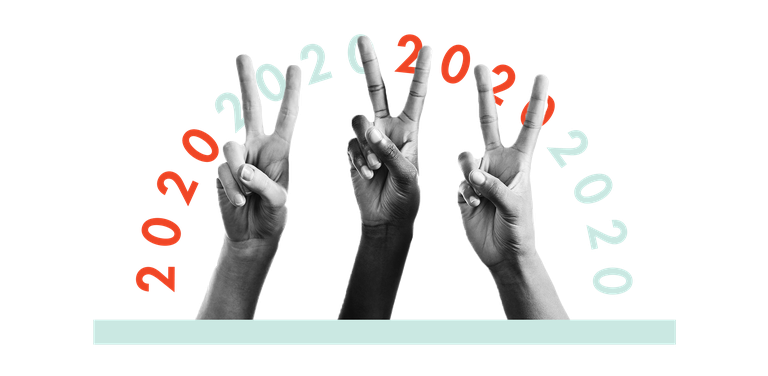
You Might Also Like

